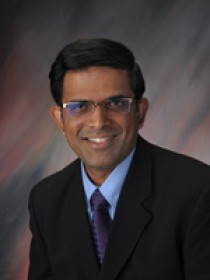
RI Seminar
February

10:00 am to 11:00 am
Event Location: NSH3305
Bio: Dr. Gorantla is Associate Professor of Surgery and Administrative Medical Director of the
Pittsburgh Reconstructive Transplant Program in the Division of Plastic Surgery at the
University of Pittsburgh. Dr. Gorantla currently oversees, administers, directs and coordinates
research and clinical programs in clinical hand, face and vascularizaed composite transplantation
at UPMC, the University of Pittsburgh, McGowan Institute and the VA Pittsburgh Healthcare
System. He currently also holds an appointment as Director of CTA in the Surgical Service Line
at the Veterans Affairs Medical Center in Pittsburgh.
Dr. Gorantla received his General Surgery training in India and Manchester, England and Hand
Surgery training at Christine M. Kleinert Institute in Louisville, Kentucky. He also completed a
PhD in Transplant Immunology from the University of Louisville with a dissertation focused on
vascularized allografts such as limb transplants.
While a Hand Surgery fellow at Jewish Hospital, Kentucky, he was a key member of the
American Hand Transplant Program. He has been involved with the American patients since its
inception and his career spans a decade of commitment to clinical and research studies in
vascularized composite grafts and hand transplantation. He is well recognized in this
groundbreaking field.
Since his recruitment in 2006, Dr. Gorantla’s efforts lead to the successful approval of the hand
transplant program by the Institutional Review Boards at University of Pittsburgh, Veterans
Affairs Healthcare System and the Department of Defense (DOD).
Dr. Gorantla is Principal and Co-Principal Investigator on two major DOD awards totaling $4.5
million to perform clinical trials aimed at minimizing immunosuppression in hand transplantation
at UPMC.
Dr. Gorantla has published widely on hand and face transplantation, the role of bone marrow
and local immunosuppression as strategies to minimize systemic immunosuppression, functional
nerve regeneration, chronic rejection and tolerance in limb transplants.
Dr. Gorantla is founding member of the American Society for Reconstructive Transplantation.
He is a member of the American Society of Reconstructive Microsurgery, the American Society
of Surgery of the Hand, the American Society of Transplantation, the Transplantation Society,
the Plastic Surgery Research Council, and the Kleinert Society.
Abstract: Millions of individuals each year sustain injuries, have tumors surgically excised or are born with congenital defects that require complex reconstructive surgeries to repair the resulting large tissue defects. A survey of organ and tissue deficiencies in the United States published in Science (Langer R, Science, 1993) revealed that more than 7 million people need tissue (skin, nerves, bone, cartilage, tendon or ligaments) for some type of reconstruction each year. There is currently no national database or registry regarding devastating craniofacial injuries requiring significant reconstruction in the civilian population. It is reasonable to estimate that management of these disfiguring, disabling and debilitating tissue injuries/losses costs the US health-care system tens of millions of dollars each year. To date, approximately 1.7 million troops have served in the two theaters of conflict in Iraq and Afghanistan. Data from these ongoing conflicts indicate that combat trauma to the upper extremity region constitutes 39% of injuries (Dougherty AL, Injury, 2009) and that trauma to the head and neck (craniomaxillofacial, CMF) region constitutes 29% of injuries (approximately 2.4 CMF injuries /service member), exceeding the incidence in WWII, Korea or Vietnam. (JTTR data, 2007; Hale RG, 2008).
Current surgical procedures after major trauma are limited by available tissues for reconstruction, morbidity from extensive surgery, prolonged rehabilitation and costs of multiple surgeries. For such complex injuries reconstructive transplantation (RT) of composite grafts can achieve near perfect restoration of tissue defects with improved functional and aesthetic outcomes and avoidance of multiple surgeries. During the past decade, more than 100 reconstructive transplant procedures have been performed around the world, including over 80 hand and 15 facial transplants. Graft survival and functional, immunologic and quality of life outcomes have been highly encouraging. However, wider application is restricted by the risks (such as infectious, metabolic and neoplastic complications) of prolonged, high dose, multi-drug (a combination of two to three agents) immunosuppression necessary to prevent graft rejection. Taken together, the morbidity of immunosuppression after RT threatens to affect the quality of life outcomes, alter the risk profile and jeopardize the benefits of a successful procedure.
Initial treatment with an antibody targeting recipient immune cells followed by triple-drug maintenance therapy represents the current standard in RT. Such a regimen has occasionally been supplemented with additional boosts in drug dosage to treat rejection episodes, and has successfully prevented loss of allografts. Early outcomes with similar cell-based therapies (Pittsburgh Protocol) in hand/forearm transplantation performed at the University of Pittsburgh Medical Center (UPMC) are promising. Indeed, UPMC is one of two centers with the largest single center experience with hand transplantation. In the past 12 months, this novel immunomodulatory protocol has been implemented in 8 hand/forearm transplants performed in 5 patients at UPMC. This protocol aims at minimizing the dose, number and duration of immunosuppressive drugs thereby augmenting the safety and efficacy of RT.
This talk will focus on the comprehensive aspects of RT. These include the planning, personnel, procedural, patient aspects related to the pre-operative, peri-operative, and post-operative protocols. The audience will also be introduced to the psychosocial, pharmacologic, and physical therapies and donor procurement aspects that are critical components of an RT program.